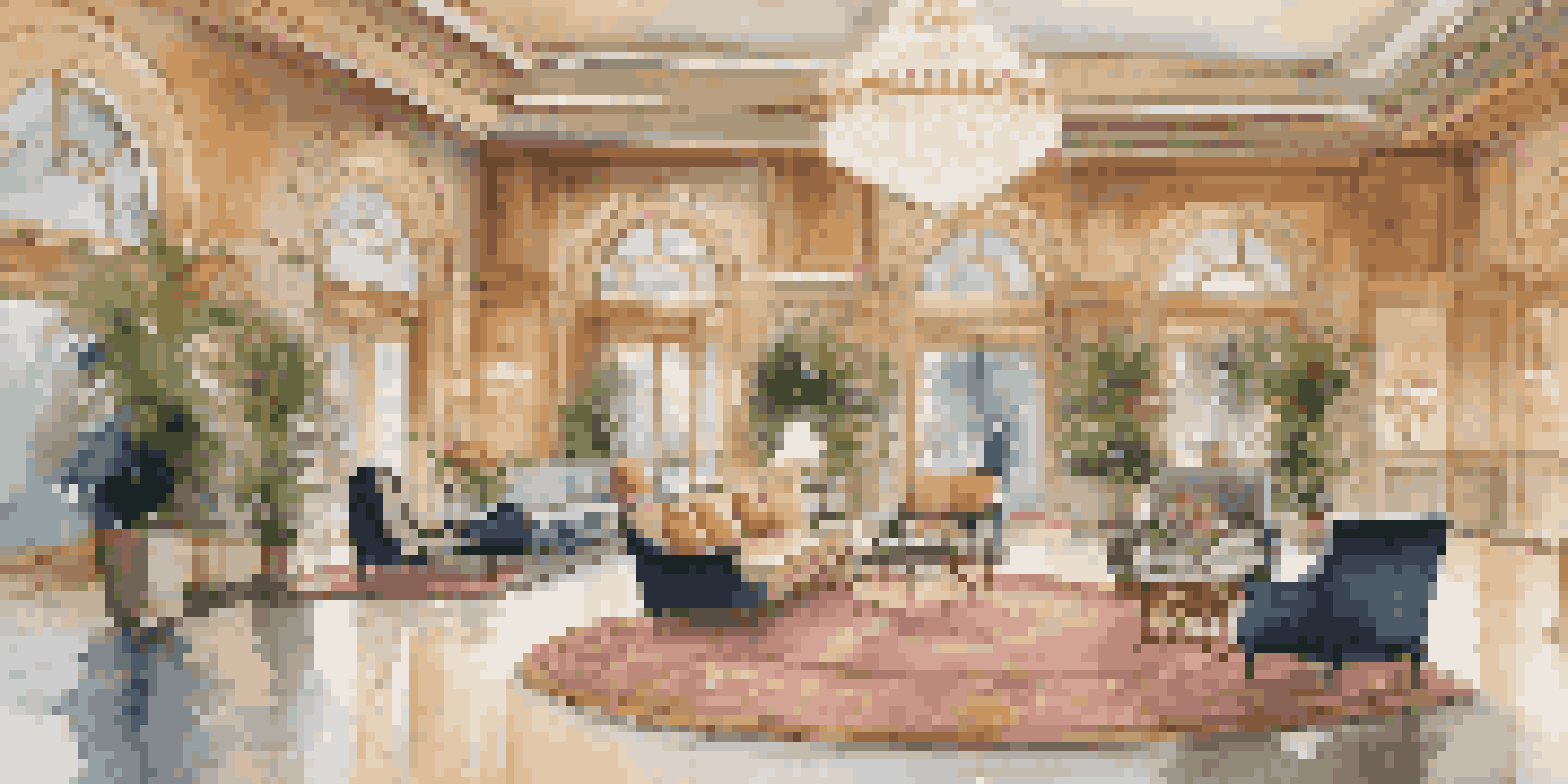The Psychology of Luxury: Understanding Guest Expectations

Understanding Luxury: More Than Just Price Tags
Luxury is often perceived as a high price tag, but it's more about the experience. Guests equate luxury with feelings of exclusivity and comfort, not just the monetary value of a product or service. For instance, a five-star hotel isn't just about plush bedding; it's about the warmth of the welcome and the attention to detail that makes them feel special.
Luxury is not a necessity to me, but beautiful and good things are.
This emotional connection can significantly impact how guests perceive their experience. When they feel valued and cared for, their expectations shift from mere satisfaction to delight. It’s this emotional layer that brands must tap into to create memorable luxury experiences.
Moreover, understanding this deeper definition of luxury allows businesses to tailor their offerings effectively. By focusing on emotional engagement rather than just lavishness, they can build stronger, loyalty-driven relationships with their guests.
The Role of Personalization in Luxury Experiences
In today’s luxury market, personalization is key. Guests expect tailored experiences that cater to their unique preferences and needs. For example, a guest might appreciate a personalized welcome note or a curated list of local attractions that match their interests.

This level of personalization fosters a sense of belonging and connection, making the guests feel like they are more than just a number. When guests see that their specific tastes and preferences are recognized, it enhances their overall satisfaction and loyalty.
Luxury is About Experience
Guests equate luxury with feelings of exclusivity and comfort, emphasizing emotional connections over mere price tags.
Luxury brands that successfully implement personalization strategies often stand out in a crowded market. By leveraging data and insights, they can anticipate guest needs, creating a seamless and memorable experience that keeps guests coming back.
Creating a Sense of Exclusivity for Guests
Exclusivity is a powerful psychological trigger in the luxury sector. When guests feel part of an exclusive group, it enhances their experience significantly. For instance, access to members-only lounges or VIP events can elevate a guest's status and satisfaction.
People will forget what you said, people will forget what you did, but people will never forget how you made them feel.
This sense of belonging can be further amplified through limited availability or bespoke services. When something is perceived as rare, its value increases, prompting guests to seek out those exclusive experiences even more.
Luxury brands can tap into this by creating unique offerings that are not widely available. By fostering a community around exclusivity, they can enhance guest loyalty and create advocates for their brand.
Anticipating Needs: The Art of Proactive Service
Anticipating guest needs is a hallmark of luxury service. Guests don't just want their requests fulfilled; they want their needs anticipated before they even voice them. For example, a hotel staff member might notice a guest's favorite drink and have it ready upon their arrival.
This proactive approach not only delights guests but also reinforces their feeling of being valued. When they experience this level of attentiveness, it creates an emotional connection that fosters loyalty.
Personalization Enhances Loyalty
Tailored experiences that cater to individual preferences foster a sense of belonging and boost guest satisfaction.
Training staff to be observant and intuitive can significantly enhance the guest experience. When employees are empowered to take initiative, it can transform a standard stay into an extraordinary one.
The Impact of Ambiance on Luxury Expectations
Ambiance plays a crucial role in shaping guest perceptions of luxury. From lighting to scent, every sensory detail contributes to the overall experience. For instance, a warm, inviting atmosphere can evoke feelings of comfort and relaxation, essential elements of luxury.
Moreover, creating a cohesive ambiance that aligns with the brand's identity enhances guest expectations. When the environment reflects the brand's values and promises, guests are more likely to feel connected and satisfied.
Thoughtful design choices, such as curated art pieces or calming music, can elevate the luxury experience. By paying attention to these details, brands can create an atmosphere that resonates emotionally with guests.
The Importance of Authenticity in Luxury Offerings
Authenticity is increasingly becoming a significant expectation in the luxury market. Guests are looking for genuine experiences that reflect local culture and heritage, rather than cookie-cutter offerings. For example, a luxury resort that incorporates local traditions into its service can create a more enriched experience.
When guests perceive authenticity, it builds trust and a deeper connection with the brand. They appreciate transparency and a commitment to genuine experiences, which can lead to higher satisfaction and loyalty.
Authenticity Builds Trust
Genuine experiences that reflect local culture and heritage resonate with guests, enhancing their connection to luxury brands.
Luxury brands that embrace authenticity can differentiate themselves in a competitive market. By showcasing their unique stories and cultural ties, they can resonate with discerning guests who value meaningful experiences.
Emotional Connections: The Heart of Luxury Experiences
At the core of luxury experiences lies the ability to forge emotional connections. Guests expect more than just a transaction; they seek moments that resonate with them on a personal level. A thoughtful gesture, like remembering a guest's special occasion, can leave a lasting impression.
These emotional connections can significantly enhance customer loyalty. When guests feel understood and valued, they are more likely to return and spread the word about their positive experiences.

Luxury brands that prioritize building these connections can create a community of loyal advocates. By focusing on the emotional aspect of service, they can ensure that every interaction is memorable and meaningful.
Conclusion: Meeting and Exceeding Guest Expectations
In summary, understanding the psychology of luxury is essential for meeting and exceeding guest expectations. By focusing on personalization, exclusivity, ambiance, and authenticity, brands can create exceptional experiences. These elements not only enhance guest satisfaction but also foster loyalty and advocacy.
Luxury is not just about what guests receive; it's about how they feel during their experiences. By tapping into the emotional aspects of luxury, brands can create lasting impressions that resonate long after the experience is over.
Ultimately, luxury brands that prioritize these psychological factors will stand out in a competitive market. By focusing on the guest experience, they can build deeper relationships and ensure sustainability in the luxury landscape.